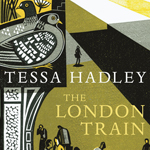Tessa Hadley’s novel is set very recognisably in London and Wales, the places linked by train. The links between the two halves of the book reveal themselves only two-thirds of the way through the narration, but continue to unspool long after you have turned the last page.
In her 1994 novel “Happenstance”, the Canadian author Carol Shields tells the story of a relationship from the wife’s point of view, and then from the husband’s. Read one story one way, turn the book over and read the other. Tessa Hadley does a similar thing, but unlike with Carol Shields’ book, I don’t think you could reserve the order in which you read them. The first half tells us about Paul, a writer who lives in the Welsh countryside with his second wife Elise and two young daughters. His story revolves around what is happening to his eldest daughter Pia. Things do happen “to” people in this novel. So Pia falls in with Polish Marek and his sister Anna and, somewhat bizarrely, her father moves into Anna’s London flat with them for a time, without telling his wife, or appearing to be concerned about the effects of his absence on his little girls.
One of things which happens to Paul is that, from time to time, he pursues a woman who is not his wife. As related in Paul’s story, this pursuit is casual, almost accidental, and without much importance. His pursuit of Anna never progresses beyond torrid dreams and a tentative physical approach which she rebuffs smartly. So lacking in lasting significance for him are these pursuits that it is a shock to the reader to discover that Cora, whose story is told in the second part of the book, is definitely present, but never named, in Paul’s story. On the few occasions he refers to her it is in passing and only as “the Welsh one, the park girl” and the reader is given no sense that his involvement with her carried any emotional charge for him. However if Paul disappoints as a person, that is a strength rather than a weakness of the writing, which shows him as weak, vacillating. We are told that when he was young he was “always wanting to be beginning again in a new place,” but he never seems to be able to carry this through. He also tells Cora he that he can never leave his little girls. “Can you forgive me for that?” he asks her, a plea which has a hollow ring to the reader who knows more of his behaviour than she does.

by Tessa Hadley
324 pp, Vintage Books, £7.99
Cora, in comparison, burns with passion. The account of her affair with Paul, told in the third person but most definitely from her point of view, is where this novel became emotionally involving for me. I don’t believe it was ever emotionally involving for Paul. Does the “wonderful” letter he writes to Cora after Elise has found him out and he has made the inevitable choice mean anything? Not really, because she has no address to which she can write, and indeed Cora “couldn’t forgive him for that letter.”
Big things happen to both Paul and Cora – for each of them the death of their mother has an impact in the book. Paul’s daughter Pia is pregnant, but not by the man he first thinks. Cora too gets pregnant, but loses the child. But to me the smaller occurrences and life as it happens from day to day carry more weight and significance in this novel than the larger life events. Tessa Hadley’s skilful descriptions create a sense of place and atmosphere in a few words. In the cemetery next to the library where Cora works, where she goes to eat her lunch, there are “floppy crows, whose feathers fitted like old mackintoshes.” In her antiques business, Paul’s wife Elise works on “plump-stuffed love-seats and misty mirrors and little spindly bureaux.”
The writing throughout is clear and precise, and this means that although the narrative is not linear the reader is never confused about the shifting time frame. At the end of the book the main characters lived on in my mind. I see Paul continuing on his well-trodden path. He will write a few more books, which he will line up on a shelf to be photographed for Sunday supplements but never really do anything that really engages him. On the other hand, at the ending of the story Cora, who has taught herself to “bite on the bitter pill”, is able to embrace the present time as “always paramount” and more important than the accumulation of memories. For her, the future could be good.



 Enjoyed this article? Support our writers directly by buying them a coffee and clicking this link.
Enjoyed this article? Support our writers directly by buying them a coffee and clicking this link.








